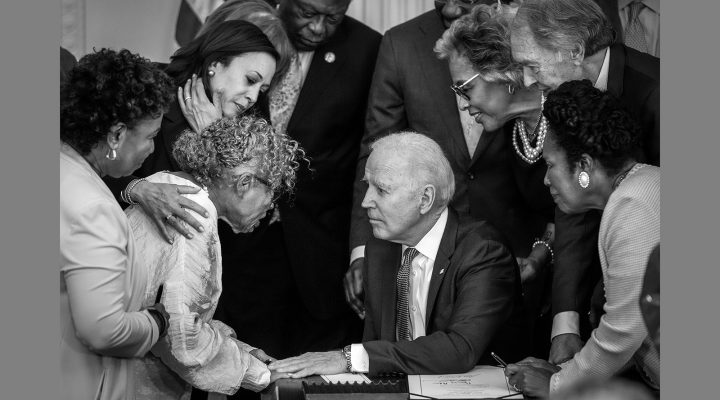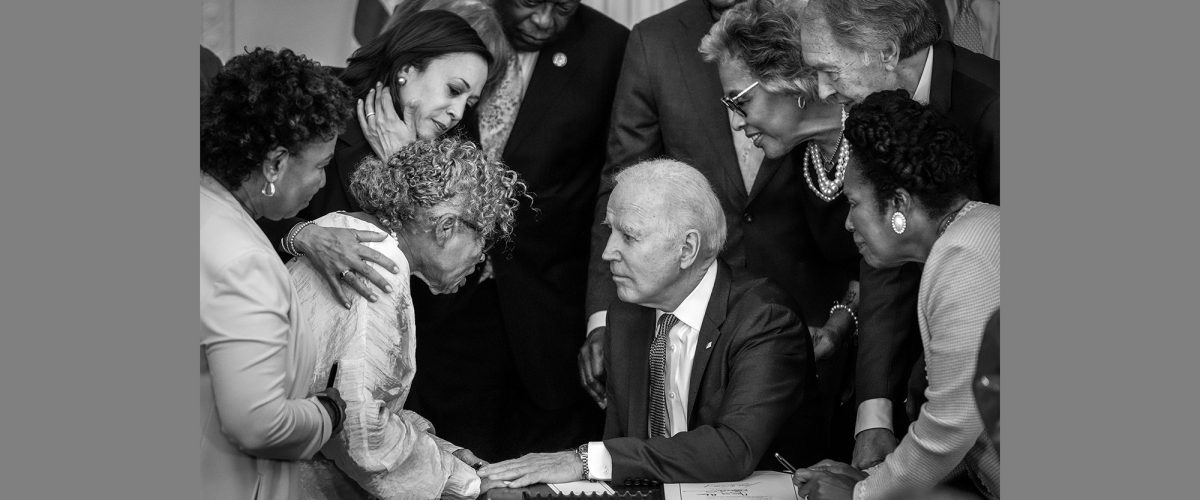Opal Lee is lovingly known as the “Grandmother of Juneteenth.” Over the past few years, she worked hard to bring awareness of this historic date to American citizens and lawmakers. The new federal holiday would not exist without her perseverance.
But at age 96, her work is not yet done. She remains enthusiastically involved in her community.
Volunteering for a myriad of organizations, she places special attention on two projects of her own. The Community Food Bank in Fort Worth, Texas, is where Lee and her team serve meals to more than 500 families a week. And Opal’s Farm, a program still being developed, is for recently incarcerated folks to practice husbandry while providing education, jobs, volunteer opportunities and fresh vegetables for the community.
Yet she is best known today for her tireless campaign to make Juneteenth a federal holiday.

Opal Lee, 94, walks toward downtown during the first nationally recognized Juneteenth holiday on Saturday, June 19, 2021, in Fort Worth, Texas. Lee made the 2.5-mile walk to symbolize the two and a half years it took for slaves in Texas to realize they had been freed. (Amanda McCoy/Star-Telegram via AP)
Just before her 90th birthday in 2016, Lee organized walks from her home in Fort Worth to Washington, D.C., to bring national attention to the cause, making local and national headlines. She walked 2.5 miles every day, commemorating the 2.5 years it took for the last enslaved people in Texas to learn they were free after President Abraham Lincoln signed the Emancipation Proclamation.
She finished her walk on Jan. 10, 2017.
As she walked, her cause gained momentum, and eventually she accrued 3 million signatures from Americans who supported making Juneteenth as a federal holiday. Still, it took four more years until an act of Congress and President Joe Biden’s signature created the new holiday in 2021.
PBS reported of that vote: “The Senate approved the bill unanimously; only 14 House Republicans — many representing states that were part of the slave-holding Confederacy in the 19th century — opposed the measure.”
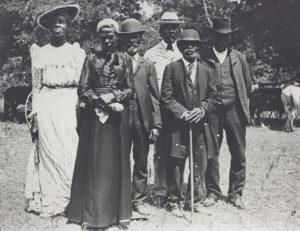
Emancipation Day celebration, June 19, 1900, held in “East Woods” on East 24th Street in Austin, Texas. (Photo: Austin History Center)
Now, a National Juneteenth Museum is being constructed in Fort Worth to educate Americans and serve as a tribute to Lee. The museum will teach guests about the experiences of enslaved people, including “factual narratives about people that overcame the trials and hardships of oppression” related to slavery.
In an interview with Baptist News Global, Opal Lee discussed how her family, faith and personal life experiences helped her develop the tenacity she needed to do such incredible work.
Asked where she finds motivation, she said: “I’d have to go way, way back to my grandparents. If they started something, they just never gave up. Whatever they took to their hand, they had to finish it, come hell or high water.”
Her grandfather was a minister, and faith has been an essential part of her family life since childhood, she said. “Grandpa was one of those people that advocated. If you started something, you’ve got to finish it, come hell or high water. He always did. And so, I attribute my grandparents and mother to the tenacity you say I have.”
“Life wasn’t easy for them,” she added. Family members lost houses to fires across multiple generations, including herself. In one of those house fires, Lee lost a grandchild.
“We’ve had a God we can turn to, who says, ‘I’m with you always,’ and we believe that.”
“We’ve had tragedy after tragedy, after tragedy,” she explained. “But we’ve had a God we can turn to, who says, ‘I’m with you always,’ and we believe that.”
Today, Lee is an active member of the African Methodist Episcopal Church. Her Christian faith fuels her passion for justice and telling the story of people being freed from slavery.
One of the most important aspects of Juneteenth for her is its educational value.
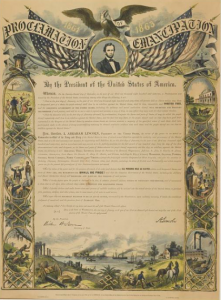 “The fact that people and nations worldwide are going to know about Juneteenth. It’s on the calendars. People are going to be off work. The holiday, it’s going to be like Martin Luther King Day,” she said enthusiastically.
“The fact that people and nations worldwide are going to know about Juneteenth. It’s on the calendars. People are going to be off work. The holiday, it’s going to be like Martin Luther King Day,” she said enthusiastically.
This day of remembrance is for all people, not just the descendants of American slaves, she insisted. “People need to know it’s not a Black thing or a Texas thing. Freedom is for everybody; If it’s not, we’re not free yet.”
She continued, “There are so many disparities. Joblessness and homelessness, and health care that some of us can get and others can’t, and climate change that we’re responsible for. We don’t seem to know our history well enough to understand that if we don’t do something … we’re going the way of other. It’s mind-boggling. But I’m going to keep on walking and talking, and maybe somebody will listen.”
And many have been listening to her, especially those in younger generations.
“Oh, the young people!” she said. “The young people are buying into Juneteenth, and I’m delighted. You see, they are the ones to get us out of the quagmire we are in.”
“If people can be taught to hate, they can be taught to love.”
Lee advises young people learning about Juneteenth to “make themselves a committee of one to change somebody’s mind. If people can be taught to hate, they can be taught to love. And it’s up to us to be responsible for doing that. We don’t have guns, but we have sharp knives. And we took 1.5 million signatures to Congress, and we were prepared to take that many more when we were called to the White House to see the president sign Juneteenth into federal law.”
She then posed this rhetorical question for readers: “Do you realize that if 3 million people were on the same page, we could turn this country around? It needs turning. And so, I’ve said it. I’ll keep on walking and talking until somebody listens.”
Lee believes everyone should all have the tenacity to continue teaching and talking about historical injustices to give future generations a leg up, starting with children. “We have to start early with the little ones and let them know,” she said.
To that end, Lee has written a children’s book to educate kids about the history and influence of Juneteenth and to explain the importance of celebrating the holiday. The book is called Juneteenth: A Children’s Story.
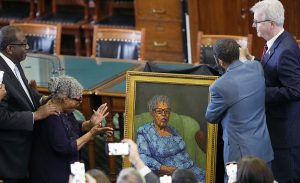
Opal Lee, who worked to help make Juneteenth a federal holiday, second from left, stands with state Sen. Royce West, left, as her portrait is unveiled in the Texas Senate Chamber, Wednesday, Feb. 8, 2023, in Austin, Texas. (AP Photo/Eric Gay)
“They need to know our history. Not to blame anybody — there’s enough blame to go around the whole world — but to make them aware of what actually happened, so it doesn’t happen again,” she asserted.
As a 96-year-old, Lee sees aspects of modern society that are alarming. Without the proper awareness and change, she warned, “we could be right back in the same predicament we were in when we were slaves. It’s so subtle, but it’s there. And if we are not vigilant, it’ll happen again.”
However, Lee holds out hope for future generations of passionate, educated and tenacious young folks who will continue to do this work, fighting for good until somebody listens: “The young people are going to be the ones to get us out of the quagmire. So, I’ve said it already. I’m going to keep on walking and talking.”
She’s not done creating modern-day miracles either. The latest one is the story of how her food bank found its new home in a facility worth $1.3 million.
“Behind my house was this huge facility that was up for sale,” she said, explaining how a previous facility had been lost to an arson fire. “They leased it to our little group for $4,000 a month, and I nearly had a hemorrhage! Girl, the Lord was in our corner.”
After just 11 months of paying the lease, the building’s owners decided to gift the facility to her group, due to the good work they were doing in the community. “Oh, girl, I wanted to do a holy dance!” she said.
Related articles:
Juneteenth and the promise of freedom | Opinion by Darrell Hamilton II
One year later, awareness of Juneteenth is growing
Juneteenth should remind us of all the things we don’t know | Opinion by Mark Wingfield
Don’t keep sweet: Why white Christians need to celebrate Juneteenth | Opinion by Erica Whitaker
To learn more about Juneteenth:
The New York Times: “Juneteenth: The History of a Holiday”
PBS: “Juneteenth is now a national holiday. How did it come to pass?”
Smithsonian Institution: “The Historical Legacy of Juneteenth”
Fort Worth Star-Telegram: “Who is Opal Lee, Grandmother of Juneteenth, nominated for the Nobel Peace Prize”

